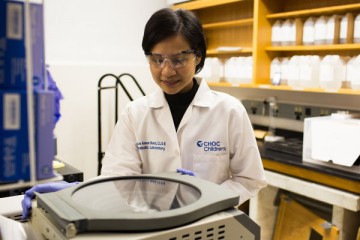Currently, there is no known cure for any form of mucopolysaccharidosis (MPS), but there are treatments available to manage symptoms, prevent complications and improve quality of life. Physical therapy may be helpful in the prevention and treatment of joint pain and stiffness that is common in all types of MPS.
Hematopoietic cell transplantation: The use of hematopoietic cell transplantation may be beneficial when performed at an early age in MPS I, providing cells that produce the missing enzymes. The use of early hematopoietic cell transplantation may help to prevent neurodegeneration and improve other symptoms, but does not reverse damage that has already happened. At CHOC, we offer the only pediatric blood and marrow transplant program in Orange County with experience in hematopoietic cell transplantation for MPS I.
Learn more about the Blood and Marrow Transplantation (BMT) Program.
Enzyme replacement: Recombinant enzyme products are available for the treatment of specific types of MPS. Depending on the enzyme that is deficient or missing, the appropriate enzyme replacement may help in reducing some of the symptoms associated with whatever disease is being treated. Research has shown that liver and spleen enlargement, as well as exercise endurance, may improve with enzyme replacement therapy. CHOC Children’s can provide provide treatment for all forms of MPS for which enzyme replacement is approved by the U.S. Food and Drug Administration.
Surgery: Various types of surgery have been performed depending on the symptom being treated. For patients with sleep apnea and obstructive airway disease, the removal of tonsils and adenoids may be beneficial in improving breathing. Surgery has also been used to relieve compression on nerves and the spinal cord, repair hernias, fix heart abnormalities, and to place shunts to allow for drainage of cerebrospinal fluid. Our MPS Multidisciplinary Center offers pediatric surgeons in all areas to address any of these needs.
Learn more about having surgery at CHOC.
Genetic testing and counseling: Individuals with a family history of MPS or who have MPS may meet with genetic counselors to discuss the risks of having additional affected children, and counseling for reproductive options.
















